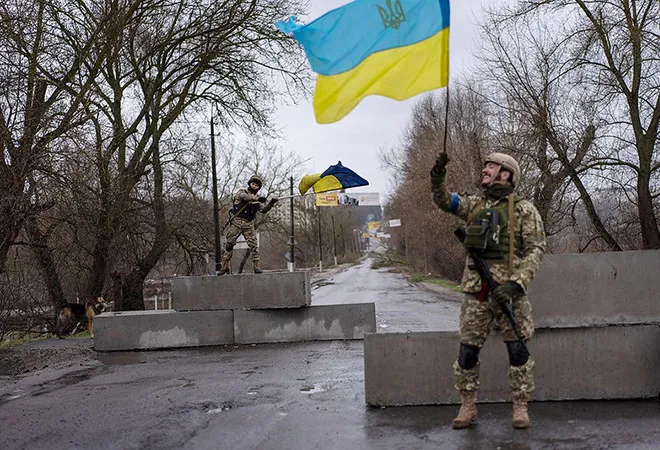-
CENTRES
Progammes & Centres
Location
The world is increasingly moving towards a bipolar world as the Ukraine war splits the world into two spheres.

The ongoing war in Ukraine is pushing the world back to a bipolar world order with former rivals rebooting for a prolonged standoff. The new round of competition will create second-and third-order effects and increasingly force unpleasant choices on countries like India.
Western allies led by the United States (US) have coalesced against Russia with the aim to isolate and weaken it as part of an emerging strategy. It’s containment 2.0 with bloc politics once again in the forefront. US President Joe Biden’s war of words against Russian President Vladimir Putin has steadily escalated over time as have arms deliveries to Ukraine. Biden has called Putin a “war criminal,” “a murderous dictator,” “a butcher,” and even accused him of committing genocide.
Biden’s national security advisor, Jake Sullivan, spelt out the US aims recently when he said on the National Broadcasting Company (NBC), “At the end of the day, what we want to see is a free and independent Ukraine, a weakened and isolated Russia and a strong, more unified, more determined West. We believe that all three of those objectives are in sight.”
A “weakened and isolated Russia” complicates the strategic picture for India in ways that policymakers would rather not contemplate. Simply put, a wounded, weak Russia is not in India’s interest. New Delhi sees Moscow as a balancing power in Asia and a crucial pole in a multipolar world. India’s preference for a multipolar order is well known but the war has diminished if not eliminated the possibility for the near term.
India’s preference for a multipolar order is well known but the war has diminished if not eliminated the possibility for the near term.
A flailing Russia will likely draw closer to China as many analysts predict and act as an anti-West pole in the emerging bipolar order. That would leave India with fewer options, essentially cramping its strategy of diversification in foreign policy. But looking at the scenario another way—India is not alone. Several major countries of the Global South do not want to be forced into a new version of bloc-style politics.
But major western countries seem to be moving inexorably in that direction. The North Atlantic Treaty Organization (NATO) Secretary-General Jens Stoltenberg said earlier this month that the relationship with Russia had “fundamentally changed” and “meaningful dialogue, as we strived for before, is not an option for Russia, which is so blatantly violating international law.” Cooperation between NATO and Russia does not exist anymore, he stressed.
NATO’s renewed legitimacy has given western leaders a new military and political purpose while cementing US leadership. Unity is easy when core interests are threatened. Russia’s war has also united Democrats and Republicans behind Biden and given him a rare bipartisan moment.
The prospect of NATO expansion once again looms with Sweden and Finland showing a clear inclination to join the alliance and jettisoning their history of neutrality. Both countries had maintained a dialogue with Russia even after its annexation of Crimea to avoid a conflagration with their neighbour.
Russia’s war has also united Democrats and Republicans behind Biden and given him a rare bipartisan moment.
But Russian invasion of Ukraine shifted the strategic landscape dramatically with public opinion growing in favour of joining NATO. If Finland and Sweden apply for membership, leaders of NATO’s existing 30 members may consider their application at their June summit in Madrid.
Unsurprisingly, the idea of Finland and Sweden joining NATO drew a sharp response from Russia including warnings of serious military-political consequences. Moscow said it would move to “rebalance the situation”. Former Russian president Dmitry Medvedev, a member of Russia’s security council and a Putin ally, talked of deploying nuclear weapons close to the three Baltic states if Finland and Sweden went ahead.
But the West’s reaction is equally sharp and getting sharper by the day. Europe is gearing to cut its dependence on Russian gas by as much as two-thirds by the end of 2022 and end all Russian oil and gas imports by 2030. For the first time, a zero option is being considered seriously by Europe.
Germany, which preferred trade and dialogue with Russia, has undergone a policy revolution of sorts. Putting the Nord Stream 2 pipeline on hold and committing to spend 2 percent of GDP on defence are radical moves for the government but they rest on the support of 69 percent of the voters, a scenario that would have been unthinkable even last year.
Europe is gearing to cut its dependence on Russian gas by as much as two-thirds by the end of 2022 and end all Russian oil and gas imports by 2030.
As the war enters its eighth week, the Biden administration sent four military cargo planes of weapons over the weekend as part of the latest installment of US $800 million in military aid. Washington has committed nearly US $2.5 billion in military assistance to Ukraine since last year in an attempt to ensure the country’s army has enough firepower against Russia. The new military package approved on 13 April includes 200 armoured personnel carriers, 18 155mm howitzers, 11 Mi-17 helicopters, and 300 drones
The US and its European allies are increasingly of the view that co-existence and cooperation with Russia are impossible. They want to limit their exposure to Russia in every major domain—from defence to finance to trade. The Biden administration’s first National Security Strategy (NSS), which should have come out last year, is being rewritten to bring Russia back in focus. The NSS was conceived with China as the primary rival and Russia as a second-tier threat but the Ukraine war caused a major rethink.
As the US refashions its strategic outlook giving more attention to European security and threats from Russia, questions will arise about resource allocation and attention to the Indo-Pacific theatre, which directly impacts Indian security. The delay in Biden administration revealing its China policy has puzzled many, especially as the West’s isolation of Russia pushes Moscow closer to Beijing.
The views expressed above belong to the author(s). ORF research and analyses now available on Telegram! Click here to access our curated content — blogs, longforms and interviews.

Seema Sirohi is a columnist based in Washington DC. She writes on US foreign policy in relation to South Asia. Seema has worked with several ...
Read More +